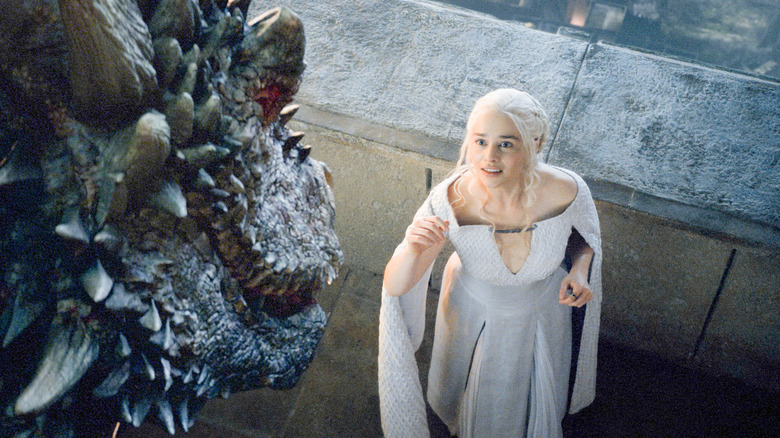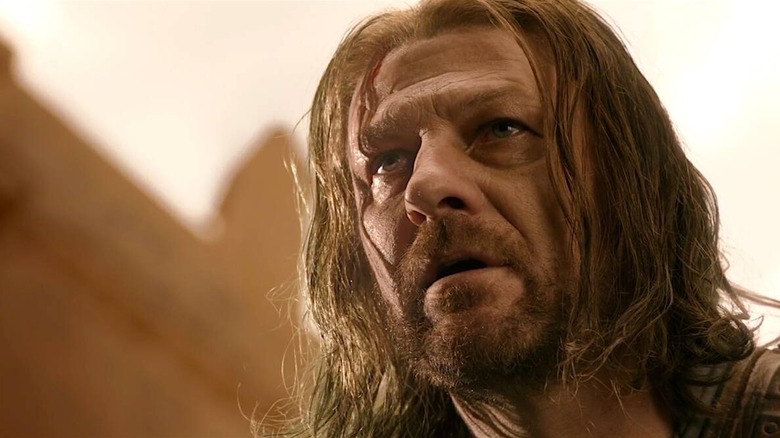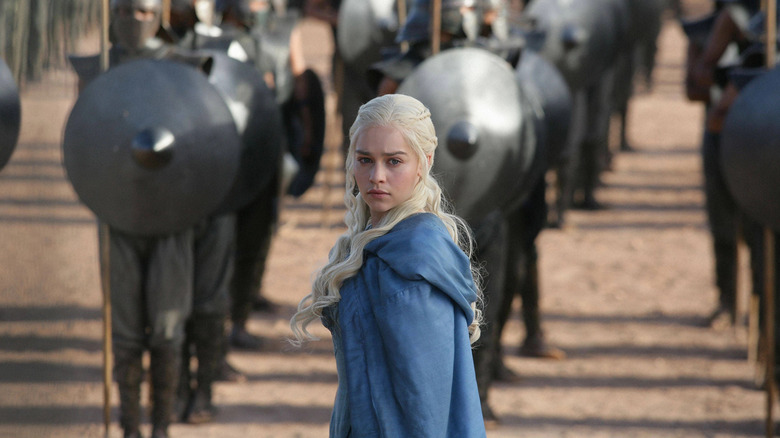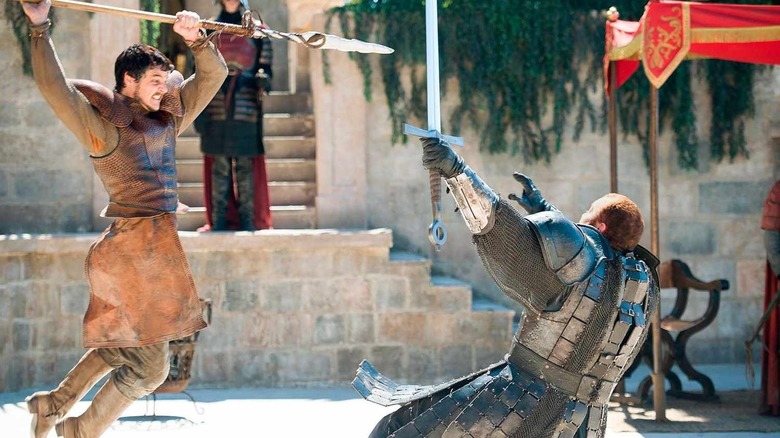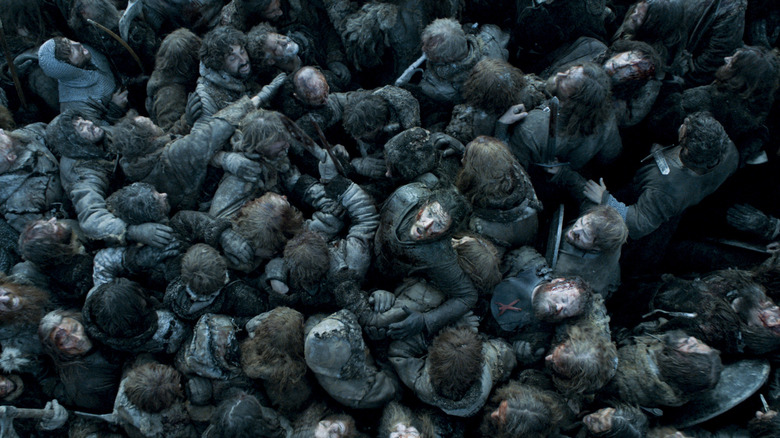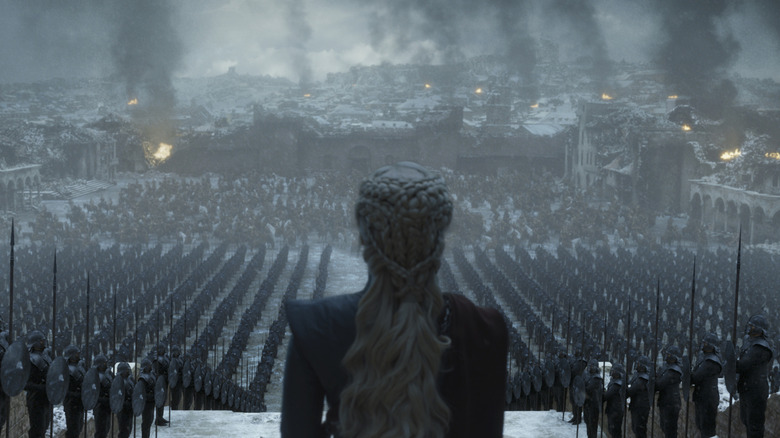5 Essential Game Of Thrones Episodes That Everyone Should Watch At Least Once
It could be argued — and will be argued, by me, right now — that during its series finale in May 2019, "Game of Thrones" squandered all of its cultural goodwill at an alarming speed. That doesn't mean, by any stretch of the imagination, that the show is bad. A lot of it is still great and worth watching! So if you're trying to understand the sprawling world of "Game of Thrones" — created by author George R.R. Martin, who penned the original novel series "A Song of Ice and Fire" — over just a few episodes, I'll be the first to tell you that's a big undertaking. Too big, perhaps. You should probably just sit down and watch the whole series and, in the process, prepare yourself for a shocking decline in quality between the season 6 finale and the season 7 premiere. (It wasn't as jarring when it originally aired for obvious time-related reasons, but I can tell you from experience that it's genuinely like watching two different shows when you're binging it.)
Anyway, if we're talking about "essential" episodes of "Game of Thrones," that doesn't mean "best episodes" or "worst episodes." It means the ones that serve as foundational pillars of the entire series for better and for worse, from a major and now legendary season 1 shocker to an episode that didn't exactly win over any viewers. Here, without further ado, are the five most essential episodes of "Game of Thrones" in case you're trying to speedrun the series or experience a very abbreviated re-watch.
Baelor (season 1, episode 9)
Ask any viewer of "Game of Thrones," whether they were casual or serious, about Ned Stark (Sean Bean), and they'll probably tell you how bamboozled they felt at the end of its ninth-ever episode, "Baelor." Throughout the show's first season, Ned, who's called to serve as Hand of the King to Robert Baratheon (Mark Addy) in King's Landing (meaning he has to leave his family home of Winterfell in the North of Westeros), grows suspicious of Robert's queen, Cersei Lannister (Lena Headey), and her extremely close relationship with her twin brother, Jaime (Nikolaj Coster-Waldau). Ned is right to be suspicious: The twins have been sleeping together for years, and as a result, her three children — including apparent heir to the Iron Throne Joffrey Baratheon (Jack Gleeson) — aren't Robert's, but are illegitimate bastards.
Ned makes the fatal mistake of telling Cersei that he's going to blow the whistle on her whole false-heir operation, and Cersei, true to form, isn't having that. Before long, Jaime subdues Ned's men, and the Hand of the late king (at this point, Robert has been murdered by Lannister forces and Joffrey is preparing to take the crown) is imprisoned for treason, leaving his daughters, Sansa (Sophie Turner) and Arya (Maisie Williams), stuck in King's Landing as captives. Though Arya ultimately escapes, Sansa is forced to watch as Joffrey orders her father's execution and the honorable man is beheaded in front of a crowd. Ned is dead, the War of the Five Kings begins in this moment, and Sansa begins a long and incredibly arduous journey to escape enemies like the Lannisters despite being their captive in the Westerosi capital. It's an ugly, brutal, and blunt episode that makes one thing quite clear: Nobody would ever be truly "safe" in "Game of Thrones."
And Now His Watch Is Ended (season 3, episode 4)
In the first two seasons of "Game of Thrones," Daenerys Targaryen — the apparent last member of an ancient Westerosi royal family played by Emilia Clarke — has to overcome some significant hurdles before she can even imagine crossing the Narrow Sea to finally retake the Iron Throne for herself and her family name. (Daenerys is the daughter of the infamous Mad King Aerys, who was killed by Jaime Lannister and whose death paved the way for Robert to become king.) In season 1, she falls in love with her husband by arranged marriage Khal Drogo (Jason Momoa) against all odds, only to watch him die. (At least she rises from his funeral pyre with three baby dragons attached to her naked body.) Season 2 sees Daenerys wandering through Qarth and getting bamboozled by sorcerers, but after she pilfers quite a lot of gold and buys some ships, she's off to the proverbial races in season 3.
That's why the fourth episode of that season, "And Now His Watch is Ended," is so important. Yes, other stuff happens in this hour — Sansa's future is being determined by the meddling Petyr "Littlefinger" Baelish (Aidan Gillen), a captive Jaime is grappling with the fact that his sword hand has been severed, and Stark siblings Bran (Isaac Hempstead-Wright) and Jon Snow (Kit Harington) are running around in the North — but the vital thing here is Daenerys. In the slave city of Astapor, Daenerys has agreed to trade her largest dragon, Drogon, to a vile master named Kraznys mo Nakloz (Dan Hildebrand) in exchange for his massive Unsullied army.
But Kraznys has no idea what he's dealing with.
After telling him she'll also take his handmaiden, Missandei (Nathalie Emmanuel), Daenerys takes the whip that controls the army and orders Drogon to barbeque Kraznys before demanding that the Unsullied kill any masters they see. Daenerys does offer the men (and, by extension, Missandei) the option to become fully free men but asks that they follow her, and within moments, they're beating their spears on the ground to show their support. It's a powerful moment for this fledgling, would-be monarch ... and it's also an indicator of things to come when it comes to Daenerys' cunning, but also her utter ruthlessness.
The Mountain and the Viper (season 4, episode 8)
Pedro Pascal wasn't on "Game of Thrones" for a long time, but a good time. During the fourth season of the series, we meet Pascal's Dornish prince Oberyn Martell when he journeys to King's Landing for Joffrey's wedding (the young king abandoned his original fiancée Sansa, a "traitor's" daughter, long before season 4 and is now set to wed Highgarden's loveliest rose Margaery Tyrell, played by Natalie Dormer). After Joffrey is brutally poisoned at his own wedding, he quite literally points the finger at his uncle, Tyrion Lannister (Peter Dinklage), in his dying moments, and Cersei orders her own brother's arrest without hesitation.
When it comes to season 4 of "Game of Thrones," I could have chosen multiple episodes here. "The Lion and the Rose," set almost exclusively at Joffrey's wedding, is a phenomenal character study of several different characters that culminates in the death of one of the show's most vile and odious characters. "The Laws of Gods and Men" features Tyrion's trial, during which his lover, Shae (Sibel Kekilli), testifies against him and claims that their entire (very consensual!) relationship was against her will and that Tyrion conspired to kill Joffrey, and this public spectacle ends with a seething, borderline violent Tyrion threatening the entire populace of King's Landing all at once. "The Watchers on the Wall" features a massive battle between the Night's Watch and wildlings, and the season 4 finale "The Children" is an incredibly impactful hour for the remainder of the series. The reason I picked "The Mountain and the Viper," though, isn't just because it features one of the most gruesome deaths in the entire show. More importantly, it's a moment where it looks like Tyrion's considerable luck has actually run out.
Tyrion chooses a trial by combat at the end of "The Laws of Gods and Men" and Oberyn offers to be his champion, largely because Cersei's champion, Ser Gregor Clegane (Hafþór Júlíus Björnsson), known as "the Mountain," raped and murdered Oberyn's sister Elia Martell and killed her children years prior. Oberyn gets the upper hand on his opponent but lets his hubris get the best of him, and the fight ends when the Mountain gouges Oberyn's eyes out and crushes his skull with his bare hands. Along with Tyrion and Oberyn's consort Illaria Sand (Indira Varma), you can't help but feel terrified about what's coming next.
Battle of the Bastards (season 6, episode 9)
When it comes to major "Game of Thrones" battles involving Jon Snow, I had a few choices. "The Long Night," which features the Battle of Winterfell in season 8, was never really under consideration; not only is Jon basically useless during that scrum, but unless you jack the brightness on your TV all the way up during that episode, you might not even know he's there. The only other real contender was "Hardhome," the season 5 episode that sees Jon face off against a White Walker for the first time while the Night King (Vladimir Furdik) watches and discovers just how deadly his powers can be. But in the end, I had to go with "Battle of the Bastards," the epic season 6 episode that pits Jon against the unbelievably evil Ramsay Bolton (Iwan Rheon).
With Ramsay holding Winterfell and Jon's youngest "half-brother" Rickon Stark (Art Parkinson), a recently reunited Jon and Sansa realize they have to act quickly to take back their childhood home — despite the fact that the Bolton forces drastically outnumber their own. Without Jon's knowledge, Sansa recruits Littlefinger's help to bring in reinforcements from the Vale just as it seems like Jon's army of wildlings and free folk will falter under the weight of the massive Bolton army, and the revenge Jon and Sansa get is nothing short of sweet. Jon, upon his return to Winterfell's courtyard, beats Ramsay to a bloody pulp — but he saves the real spoils for Sansa, who was married off to the brutal, sadistic bastard during season 5 and suffered greatly as his wife.
Sansa, knowing that Ramsay intentionally starved his hounds so he could feed his victims to them, takes advantage of the opportunity she's given. As she leaves Winterfell's kennels, Ramsay is torn to shreds by his own hungry dogs, ending the tenure of one of the most insidious villains in all of "Game of Thrones." After watching Sansa be beaten and brutalized as Ramsay's wife and property, it's undeniably satisfying to watch her get revenge in the darkest way possible.
The Iron Throne (season 8, episode 6)
I didn't say all of these were good "Game of Thrones" episodes, I said they were essential, and unfortunately, the series finale, "The Iron Throne," definitely counts. After seasons 7 and 8 proved to be enormous disappointments compared to the rest of the series, it's safe to say that fans were dreading what might happen in the finale (speaking from experience, I was certainly filled with dread ... and was, unfortunately, proven right). Here's the thing: A lot of stuff that happens in "The Iron Throne" (and its preceding episode "The Bells," which is basically sort of like the first half of the finale) felt inevitable. Daenerys was probably always going to follow in her father's footsteps and become the "Mad Queen." A new monarch was likely going to be chosen to run Westeros. Main characters would probably die. Still, the way it happened wasn't just rushed. It was lame.
In "The Bells," Daenerys goes bananas after losing Missandei, a large faction of her forces, and two of her dragons, so while approaching King's Landing on Drogon's back, she simply torches the city without bothering to spare any civilians. (Cersei dies in the process because she and Jaime insist on hugging underneath a big loose pile of rubble in the Red Keep.) When "The Iron Throne" opens, Daenerys has overtaken King's Landing, and many of her Dothraki hordes have somehow suddenly respawned thanks to her victory. But Tyrion and Jon are pretty worried that their new leader just committed a mass genocide. Tyrion, who's imprisoned for giving up his position as Daenerys' Hand of the Queen, implores Jon to handle the situation, so Jon — who, up until this point, was Daenerys' lover and her nephew, because he's actually been a secret Targaryen this entire time and not a bastard at all! — stabs Daenerys before she can even sit on the dang pointy chair she's been lusting after for eight seasons.
Jon is exiled to the Night's Watch (which doesn't need to exist anymore because the Night King and his army have been defeated), Bran is named King of the Seven Kingdoms for really no reason at all (and given the unbelievably rude name of "Bran the Broken"), Sansa is named Queen in the North, Arya sets off to find what's "west of Westeros" (can't Bran, who's now multitasking as the omniscient Three-Eyed Raven, just tell her?!), and all is, generally, well that ends well. "The Iron Throne" stinks, no matter how many staunch defenders I can find right here at /Film ... but it's still an "essential" episode of "Game of Thrones," for better and, certainly, for worse.
"Game of Thrones" is streaming on HBO Max now.
